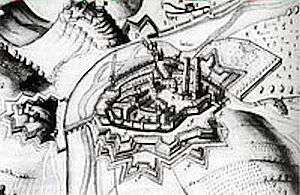Siege of Alès
The Siege of Alès was undertaken by Louis XIII of France, and the city captured on 17 June 1629.
| Siege of Alès (1629) | |||||||
|---|---|---|---|---|---|---|---|
| Part of the Huguenot rebellions | |||||||
 Siege of Alès in June 1629. | |||||||
| |||||||
| Belligerents | |||||||
|
|
| ||||||
| Commanders and leaders | |||||||
|
|
| ||||||
The siege
The Siege of Alès followed the disastrous capitulation of the main Protestant stronghold of La Rochelle, in the Siege of La Rochelle. Huguenot resistance persisted in the south of France though, and Louis XIII endeavoured to eliminate it as well.[1] With Privas and Anduze, the city of Alès was at the center of a string of Protestants strongholds in the Languedoc, stretching from Nîmes and Uzès in the east, to Castres and Montauban in the west.[2] Ales was selected by Antoine Hercule de Budos, Marquis des Portes (1589-1629), as a strategic target to severe Huguenot defenses in two and disconnect their main centers of Nîmes and Montauban.[2]
After Privas fell on 28 May 1629, in which the Marquis des Portes was killed, French attention turned to Alès. After an intense siege, the city surrendered on 17 June. At the end of the siege, Henri, Duke of Rohan, the leader of the Huguenot rebellion, submitted.[1]
Aftermath

The remaining Huguenot cities rapidly fell, and finally Montauban surrendered without resistance.[2] This was one of the last events in the repression of the Huguenot rebellions in France.[2]
The siege was followed by the Peace of Alès (27 September 1629), which settled the revolt by guaranteeing the practice of the Huguenot religion and judicial protection, but requiring Huguenot strongholds as well as political assemblies to be dismantled.[3][4]
Notes
- Rebels and Rulers, 1500-1660: Provincial rebellion by Pérez Zagorín p.18
- Siege Warfare: The fortress in the early modern world, 1494-1660 Christopher Duffy p.121
- Religion and royal justice in early modern France by Diane Claire Margolf p.19
- The Cambridge illustrated history of France by Colin Jones p.145